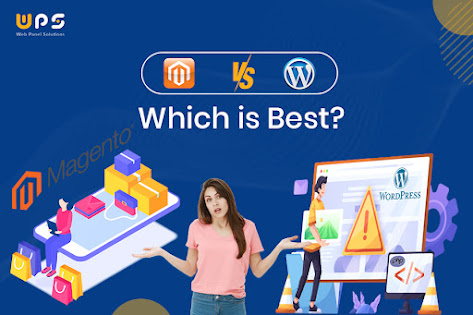When it comes to selecting the platform to create an online store, two most suitable options are Magento and WordPress. This article will ensure you have the understanding between Magento and WordPress so that you can settle for the best depending on your needs. Below is a comparison of the two in terms of various key aspects.
In case you need any help after and before reading this blog, contact
Web Panel Solution- a Custom Magento development services provider with exposure to WordPress as well.
1. Overview of Platforms
Magento: Magento is a free to use e-commerce solution software created specifically to help users manage their e-shop. It is very strong and very malleable and suited for all but the very largest enterprises, or those with simple e-commerce requirements.
Magento offers two main versions: It has two products, Magento Open Source which is a free to use software and Magento Commerce which is paid and has added features as well as cloud hosting options.
WordPress: WordPress is a freely available and cost effective software that was primarily developed for creating blogs and has since then expanded the capacity to design any other Website.
Although it is not primarily built for the e-commerce business, it is tailor-made for large content-rich websites, weblogs, portfolios, and business web pages. WordPress is very easy to use meaning that it can be used by an individual, small business and even one who has no programming skills and is just in need of a simple platform to build a website.
2. Ease of Use
Magento: Working with Magento is not as easy as it sounds as it requires one to have a certain level of technical knowhow as opposed to Woocommerce which is relatively easier to set up and manage.
Writing automated acceptance tests is best suited for developers or businesses that have access to the professional development resources. It allows its users more options for the layouts and design, though it requires more coding skills and e-commerce knowledge. Reach out to Web Panel Solution for custom Magento development services.
WordPress: WordPress is famous for being an easy system to use and you do not need to be a computer genius to work on it. Though it is a content management system it is particularly tailored for the creation of websites without requiring a user to know how to code.
The use of WordPress is easy to learn and it introduces a simplified
dashboard that gets rid of technicalities by use of different tabs that one can
easily access to create their content such as text, images, videos and other
enhancements like themes among others.
3.
Features and Functionality
Magento: Magento falls under the category of feature-rich software that can exist as a comprehensive e-business solution.
It provides enhanced elements such as multi-organisation management, the possibility to work with different languages and currencies, custom fields for products, detailed and useful statistics, and many others, integration with many additional services. This makes Magento suitable for larger enterprises than other platforms because of the capability to handle high varieties of products and transactions.
WordPress: WordPress is very versatile when it is used to handle content. It provides thousands of themes and plugins that can be applied to further site functionality. Although it is not specifically built for e-commerce, WordPress is especially good for creating a wide variety of content-rich websites, including blogs, news sites, portfolios, and corporate sites.
Its customization is way easier for non-developers because it has a
massive user base and a wealth of plugins.
4. Performance and Scalability
Magento: There is one more absolutely significant and highly appreciated feature of Magento: it is an ideal instrument for large-scale e-commerce. It is optimized for high traffic and it is also capable of growth and maintaining the speed necessary as your business evolves.
Nevertheless, as compared to most of its competitors, Magento is highly resource-intensive, thus it is critical to host it on a high-performance platform. The hosted version of Magento Commerce Cloud has all the infrastructure required for large stores or businesses.
WordPress: For business sites of small to medium size, WordPress is quite suitable, particularly if the site is properly hosted, and cached, as well as secured. It can power big content and traffic, as well as has some features for the content management, though it is not as oriented on the requirements of a great e-business site as Magento.
To the extent that many content-heavy sites need a robust platform that
can be easily scaled with the right infrastructure, WordPress is as good a
platform as any.
5. Security
Magento: Magento has functionalities for enterprise-level security and is recognized as having a major emphasis on security.
Magento is an open source solution for e-commerce that provides regular updates, patches and has extensive controls over security. Here are some of the drawbacks that require businesses using Magento to keep the platform up to date and follow some best security measures to secure their site.
WordPress: Open-source content management systems like WordPress are, in general, safe but because they are popular they remain a primary choice for hackers. It is mainly influenced by the themes and plugins selected, as well as by such measures as update frequency, password protection, and secure web hosting.
Security can be advanced on the WordPress platform by the plugins and by employing standard security measures that are recommended within the WordPress community.
6. Cost
Magento: First of all, it is essential to understand that the cost of using Magento can be rather high, particularly if you work with the Magento Commerce option. But, as in any software, you may need to pay for hosting, development, and maintenance even with Magento Open Source, and that is why in certain respects it will be more expensive.
But for the large business organization where there are many intricate requirements, the investment could be justified.
WordPress: WordPress is an open source, so it is free to use, but one incurs various expenses including the purchase of themes, plugins, and hosting. Nevertheless, such costs are usually lower than those one would observe when using Magento.
WordPress is quite cheap and therefore end-users, bloggers and small
scale businesses can be able to create a professional website at a one-time
cost.
Conclusion
Magento and WordPress both are strong e-commerce platforms, however, both are not used by the same type of users. Magento is ideal for large enterprises with big and complicated requirements and with the capacity to work with a fairly high degree of flexibility and growth.
On the other hand,
WordPress is perfect for small to medium sized companies desiring for a more
versatile and easy-to-implement solution with comparatively low entry
hindrances. If you need any help with Magento, Wordpress or any other platform,
contact Web Panel Solutions. Web Panel Solutions is also a leading Shopify website development company.







0 Comments